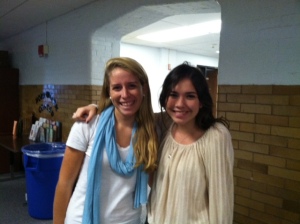by Lincoln Zweig and John Morris
[slideshow]
This was a very successful week for the lionfish research team. On Tuesday we had two great reading note presentations and started to work on our first group project. By our next class on Friday we had a PowerPoint set up that described our research group’s purpose. After a practice presentation we went out into the field. Each buddy team finished three transects at the first dive spot that went very well. However, the reef was quite flat so we didn’t see too many lionfish or grouper. A bolt of lightening then interrupted our dive, and we headed back to The Island School. Apparently the weather gods don’t like it when we dive on Friday. Saturday was an almost flawless day in the field. We got to both of our desired dive sites and had very well set up transects at each one. We saw more lionfish and grouper on Saturday because the reefs we visited had more ledges for lionfish to use as shelter. As a group we are definitely ready and excited for our presentation on Tuesday!

